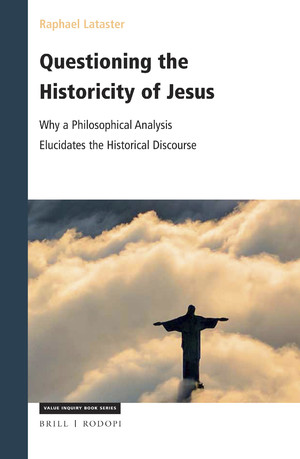 Until now I have been working from a digital version of Raphael Lataster’s Questioning the Historicity of Jesus: Why a Philosophical Analysis Elucidates the Historical Discourse, that was supplied to me by Brill for these review posts. I have since been forwarded by Brill a physical copy of the book after I informed them that it might make exploring it for discussion a little easier. It does make a nice change to leaf through fresh clean book-odour pages and marking them with a light pencil. I am also reminded of the retail price with a physical copy of this volume: Brill advertises both the e-book and hardback at $US210. The Australian Amazon site equates that to $A294.97 + $15 postage. Australia’s Dymocks bookstore advertizes it at $A587.99 Those sorts of prices tell us that Brill clearly is looking at libraries (in particular academic libraries) as its primary market. (The publisher balances costs of publication against expected sales and such prices are not uncommon for scholarly books; so don’t assume the prices are a gold mine for the authors.) At this point it is appropriate to recall the emerging number of scholars (discussed in the opening post in this series) who are prepared to consider the Christ Myth theory as a reasonable hypothesis that deserves serious discussion if not outright acceptance.
Until now I have been working from a digital version of Raphael Lataster’s Questioning the Historicity of Jesus: Why a Philosophical Analysis Elucidates the Historical Discourse, that was supplied to me by Brill for these review posts. I have since been forwarded by Brill a physical copy of the book after I informed them that it might make exploring it for discussion a little easier. It does make a nice change to leaf through fresh clean book-odour pages and marking them with a light pencil. I am also reminded of the retail price with a physical copy of this volume: Brill advertises both the e-book and hardback at $US210. The Australian Amazon site equates that to $A294.97 + $15 postage. Australia’s Dymocks bookstore advertizes it at $A587.99 Those sorts of prices tell us that Brill clearly is looking at libraries (in particular academic libraries) as its primary market. (The publisher balances costs of publication against expected sales and such prices are not uncommon for scholarly books; so don’t assume the prices are a gold mine for the authors.) At this point it is appropriate to recall the emerging number of scholars (discussed in the opening post in this series) who are prepared to consider the Christ Myth theory as a reasonable hypothesis that deserves serious discussion if not outright acceptance.
So far we have surveyed Lataster’s Part 1, his analysis of the case for Jesus having been a historical figure (the first three chapters) and Part 2, the justification for being agnostic about the question of historicity (the next three chapters). We now come to the third and final part of the book, “The Case for Mythicism”.
Here Lataster hews closely to Richard Carrier’s exhaustive (ca. 600 pages) case for mythicism in On the Historicity of Jesus: Why We Might Have Reason for Doubt. His case therefore entails a justification of Carrier’s Bayesian approach to the question. (See part 4 of this series for an earlier discussion by Lataster in which he addressed some common misconceptions about this application of Bayes’ theorem.) I think Lataster has made a worthy contribution by abbreviating and simplifying Carrier’s arguments and overall thesis. The main reason I think so is the quite disjointed and misleading criticisms I have seen online (including in the scholarly Journal for the Study of the Historical Jesus) of Carrier’s book. Too often criticisms have targeted specific discussions in On the Historicity of Jesus without giving readers any indication of the context and weight put on those points by Carrier himself. So Carrier lists forty-eight pieces (or “elements”) of background information that need to be considered against any detailed arguments for or against historicity, with each of them having different degrees of significance, and none being of itself decisive, yet some critics will take just one or two of these points of background discussion and give readers the impression that they are foundations of his entire argument, and so convey the notion that criticizing just those is enough to demolish the case for mythicism. To read Lataster’s discussion of Carrier’s book is to refresh one’s memory of exactly both the method and details of Carrier’s presentation — something several critics apparently failed to grasp. Continue reading “Review part 8: Questioning the Historicity of Jesus / Lataster (Case for Mythicism)”
